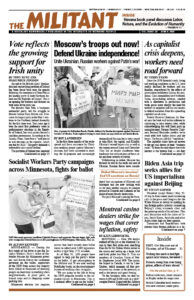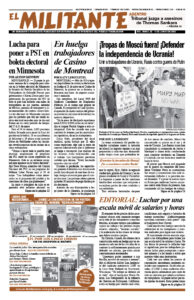An end to the British rulers’ domination and centurylong partition of Ireland has been thrust back onto the agenda following the emergence of Sinn Fein as the leading party in both Northern Ireland and the Republic of Ireland. This is an opening for workers and farmers on both sides of the Irish Sea.
For decades Sinn Fein, a bourgeois nationalist party, led the struggle to liberate Ireland from British rule. It became the largest party in the May 5 elections to the Northern Ireland Assembly for the first time ever. Two years ago it won the most first preference votes in parliamentary elections in the Republic of Ireland, but rival parties formed a coalition government. According to the Sunday Times, Sinn Fein is “well placed to win elections in the republic, which are due by 2025.” The party demands a referendum on a united Ireland.
The partition of Ireland was imposed by London in 1921 after a popular war of independence liberated most of the country from British control. Britain’s rulers clung onto the northern six counties, seeking to shore up their dwindling world role and entrench their domination over the profitable industries there. Through divide and rule, pitting Protestants against Catholics, London aimed to undermine working-class solidarity and struggle in both Ireland and Britain.
Massive struggles in Northern Ireland erupted at the end of the 1960s against anti-Catholic discrimination fostered by the British rulers in employment, housing, education and representation. The civil rights movement gained support of working people in the South and internationally. In 1969 the U.K.’s Labour Party government sent troops to the North in an attempt to repress these mobilizations and prevent them from threatening British rule. During the conflict, London interned thousands without trial, tried to silence Irish nationalist leaders and unleashed deadly violence, but failed to crush the struggle for civil and national rights.
This led to the 1998 Good Friday Agreement between London, Dublin and parties in Northern Ireland. The British rulers dismantled much of their repressive apparatus and, over time, anti-Catholic discrimination lessened. The deal established a Northern Ireland Assembly that would collaborate with the government of the Irish Republic on cross-border issues.
The agreement kept Northern Ireland in the U.K. But in subsequent years blows have been dealt to sectarian divisions fostered by London among working people. Bakery workers on strike last year at Hovis in Belfast told Militant reporters that Catholic and Protestant workers were united in their fight for better pay.
Sinn Fein: ‘Prepare unification’
Following this month’s election, Sinn Fein Deputy President Michelle O’Neill called on the Irish government to establish an all-island citizens’ assembly tasked with planning for unification of the country.
The Democratic Unionist Party had been the largest party in Northern Ireland prior to the election and came in second. It favors continued “union” between Northern Ireland and the U.K. Sinn Fein is now entitled to nominate the First Minister for Northern Ireland — a bitter pill to swallow for unionist parties.
The DUP says it will refuse to take its seats in the power-sharing Northern Ireland Assembly, ensuring the body can’t function. It demands U.K. Prime Minister Boris Johnson scrap a post-Brexit deal with the European Union on custom checks in Ireland. Under that agreement, customs checks on goods going to and from the U.K. are not carried out at the border dividing Ireland, but at Northern Irish ports, ensuring a free flow of goods across the island. The Republic of Ireland remains in the EU.
Last week Johnson threatened to get rid of that customs arrangement. The conflict over this has exposed a contradiction between unionist parties, like the DUP, and the needs of many capitalists who operate in Northern Ireland, Britain and elsewhere.
Alongside the aspirations of workers and farmers for Irish unity, the operation of capitalism is propelling moves toward the reunification of the country. Especially since 1998, cross-border trade, investment and travel have mushroomed.
Paul Murnaghan, Northern Ireland Chamber of Commerce and Industry chief, decried the Democratic Unionist Party’s refusal to sit in the assembly. “While this continues, the reputational damage to Northern Ireland as a place to invest and work grows daily,” he told the Belfast Telegraph.
EU officials threaten trade sanctions on the U.K. if London unilaterally ends current customs arrangements and imposes new ones at the border between Northern Ireland and the Republic of Ireland. President Joseph Biden called on Johnson to retreat on this.
“Britain should get out of Northern Ireland now,” said Pamela Holmes, Communist League candidate for mayor of Tower Hamlets in east London in U.K.’s May 5 local elections. “This would strengthen unity and struggles of working people in each country in defense of their class interests. Championing Irish independence is vital to forging the working-class leadership needed for a revolutionary struggle for a workers and farmers government — both in Ireland and in Britain. Ireland is one!”

